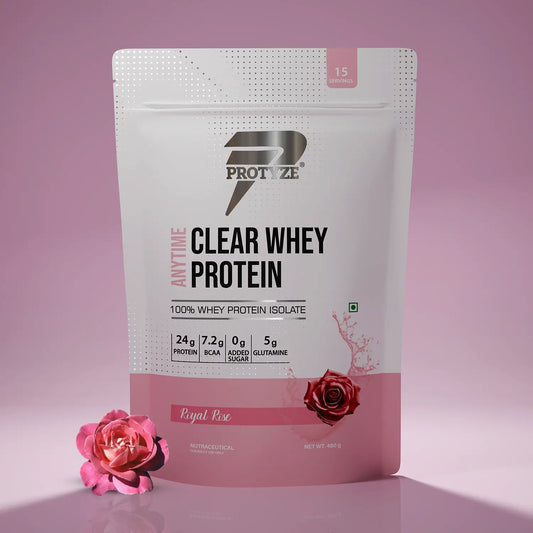Protein powders are a popular choice for fitness enthusiasts, supporting muscle growth, recovery, and overall nutrition. However, if you’re managing conditions like gout or kidney stones, you might wonder: is your protein powder high in purines? Purines, compounds found in certain foods, can raise uric acid levels, potentially leading to health issues. Understanding the purine content of protein powders is crucial for making informed choices that align with your wellness goals.
This blog explores purines in protein powders, their impact, how to select low-purine options, and strategies to balance nutrition. We’ll also highlight Protyze Diet Clear Whey, a low-calorie, low-purine protein supplement, to support your health-conscious diet.
What Are Purines and Why Do They Matter?
Purines are natural molecules found in many foods and produced by the body during cell turnover. When broken down, they form uric acid, a waste product excreted by the kidneys. While uric acid is typically harmless, excessive levels can accumulate, leading to:
- Gout: Painful joint inflammation from uric acid crystal buildup.
- Kidney Stones: Uric acid crystals forming in the kidneys, causing discomfort.
- Chronic Inflammation: Elevated uric acid contributing to joint or metabolic issues.
Protein powders, often derived from animal or plant sources, may contain purines depending on their ingredients. For individuals prone to high uric acid—due to genetics, high-protein diets, or lifestyle factors—choosing a low-purine protein powder is essential to avoid exacerbating these conditions while still meeting fitness and nutrition needs.
Purines in Protein Powders: Sources and Concerns
Protein powders vary widely in their purine content based on their primary protein source. Below, we explore common types of protein powders, their purine levels, and considerations for those monitoring uric acid.
1. Whey Protein
Whey protein, derived from milk, is a complete protein rich in essential amino acids, widely used for muscle recovery. It’s generally low in purines, with whey isolate containing negligible amounts (<50 mg purines per 100g) due to its high processing, which removes most non-protein components. Protyze Diet Clear Whey, a whey isolate with 15g protein per serving, is 99% lactose-free and low-purine, making it a safe choice for those concerned about uric acid. However, some whey concentrates may retain trace purines, so checking the label is key.
Purine Level
- Low, especially in isolates.
Concern
- Minimal risk, but avoid blends with high-purine additives.
2. Casein Protein
Casein, another milk-derived protein, is slower-digesting than whey, often used for sustained muscle repair. Like whey isolate, casein is low in purines (<50 mg per 100g) due to its purified nature. However, casein powders with added ingredients, such as flavorings derived from high-purine sources, could slightly increase purine content.
Purine Level
- Low, similar to whey isolate.
Concern
- Check for additives; pure casein is safe for low-purine diets.
3. Plant-Based Protein (Pea, Hemp, Rice)
Plant-based proteins, such as pea, hemp, or rice, are popular among vegans and those with dairy sensitivities. However, some plant proteins, like pea, can have moderate purine levels (50-100 mg per 100g), especially if sourced from purine-rich legumes. Rice protein is typically lower in purines, but blends combining multiple plant sources may vary.
Purine Level
- Moderate to low, depending on the plant source.
Concern
- Higher risk than whey isolate; read labels for legume-based blends.
4. Meat-Based Protein (Beef, Chicken)
Beef or chicken protein powders, made from animal tissue, are less common but high in purines (100-200 mg per 100g), similar to whole meats. These powders are often marketed for paleo diets but pose a significant risk for those managing uric acid levels, as they directly contribute to purine load.
Purine Level
- High, comparable to red meat.
Concern
- Avoid if you’re at risk for gout or kidney stones.
5. Egg Protein
Egg protein, derived from egg whites, is a complete protein with minimal purines (<30 mg per 100g). It’s an excellent low-purine option for those seeking dairy-free alternatives, offering similar benefits to whey isolate without the purine concerns of meat-based powders.
Purine Level
- Very low, ideal for uric acid management.
Concern
- Rare, but ensure no high-purine additives in flavored versions.
Health Implications of High-Purine Protein Powders
Choosing a protein powder with high purine content can elevate uric acid levels, particularly for those with:
- Predisposition to Gout: High-purine powders, like beef protein, may trigger flare-ups, causing joint pain.
- Kidney Concerns: Excess uric acid can form stones, leading to discomfort and urinary issues.
- High-Protein Diets: Consuming multiple servings of purine-rich powders alongside other high-purine foods (e.g., red meat) compounds the risk.
Low-purine protein powders, such as whey isolate or egg protein, minimize these risks while delivering 15-30g protein per serving for muscle support. Protyze Diet Clear Whey, with its low-purine, probiotic-enhanced formula, supports gut health and recovery, making it ideal for those balancing fitness and uric acid management.
How to Choose a Low-Purine Protein Powder
To ensure your protein powder aligns with a low-purine diet, consider these factors when selecting a product:
- Check the Protein Source: Opt for whey isolate, casein, or egg protein, which have negligible purines. Avoid beef or legume-heavy plant proteins.
- Read the Ingredient List: Look for pure formulations without high-purine additives (e.g., yeast extract, organ meat derivatives).
- Prioritize Isolates: Whey or casein isolates, like those in Protyze Diet Clear Whey (15g protein, Juicy Lychee flavor), are highly processed to remove purines and lactose, ideal for sensitive individuals.
- Verify Certifications: Choose products with clear labeling and third-party testing for purity and safety.
- Assess Your Needs: If you consume high-purine foods elsewhere (e.g., sardines), a low-purine powder is critical to balance your diet.
- Example Use: Mix Protyze Diet Clear Whey with 200-300ml water post-workout for a low-purine, 99% lactose-free protein boost, supporting muscle recovery and gut health without uric acid concerns.
Balancing Protein Powders with a Low-Purine Diet
To integrate protein powders into a low-purine diet, combine them with other low-purine foods and lifestyle habits that support uric acid management.
Low-Purine Food Choices
- Proteins: Eggs, low-fat dairy, and tofu provide 10-20g protein per 100g with minimal purines (<50 mg).
- Vegetables: Cucumbers, zucchini, and leafy greens contain 0-20 mg purines per 100g, adding fiber and hydration.
- Fruits: Cherries, apples, and bananas are low-purine and rich in antioxidants, helping to lower uric acid.
- Grains: Rice, oats, and quinoa offer energy with negligible purines.
Balanced Nutrition
- Protein Needs: Aim for 1.0-1.6g/kg body weight (60-110g for 70kg) using low-purine sources to support muscle health. A shake like Protyze Diet Clear Whey provides 15g protein without adding purines.
- Carbohydrates and Fats: Include whole grains and healthy fats (e.g., avocados, olive oil) for satiety, keeping calories balanced (~1,800-2,000 kcal for maintenance).
- Gut Health: Probiotics aid digestion, which can be stressed by high-purine diets. The probiotics in Protyze Diet Clear Whey promote gut balance.
Lifestyle Habits
- Hydration: Drink 2.5-3L water daily to dilute uric acid and support kidney function.
- Exercise: Engage in moderate activities like walking or yoga (30 min, 3-4x weekly) to maintain a healthy weight, as excess fat can increase uric acid.
- Portion Control: Use 1-2 servings of protein powder daily, avoiding overuse to keep purine intake low.
Sample Low-Purine Meal Plan with Protein Powder (70kg Person)
- Breakfast: Oatmeal with cherries, low-fat yogurt, apple slices.
- Lunch: Quinoa salad with grilled tofu, cucumber, and avocado.
- Post-Workout/Snack: Protyze Diet Clear Whey (15g protein, 99% lactose-free, Juicy Blueberry) with water, handful of walnuts.
- Dinner: Brown rice, egg stir-fry, steamed zucchini, herbal tea.
- Daily: 2.5-3L water, 30 min yoga 3x weekly, 7-9 hours sleep.
- Timeline: Reduced joint discomfort or improved energy within 2-4 weeks; sustained health benefits in 6-8 weeks.
Conclusion
Understanding whether your protein powder is high in purines is vital for balancing fitness goals with health, especially if you’re managing gout, kidney stones, or uric acid levels. While whey isolate, casein, and egg proteins are low-purine and safe, meat-based or legume-heavy plant proteins can elevate uric acid, posing risks. By choosing low-purine options like Protyze Diet Clear Whey, with its 15g protein, low-calorie, probiotic-enhanced, 99% lactose-free formula, you can support muscle recovery and gut health without purine concerns. Pair your powder with a low-purine diet rich in eggs, vegetables, and fruits, and maintain hydration and exercise for optimal wellness.
TL;DR
If you're managing gout, kidney stones, or high uric acid, choose low-purine protein powders like whey isolate (Protyze Diet Clear Whey), casein, or egg protein. Avoid high-purine meat-based or legume-heavy plant proteins. Protyze Diet Clear Whey offers 15g protein, is 99% lactose-free, probiotic-enhanced, and low in purines—ideal for muscle recovery and gut health. Pair with low-purine foods (eggs, vegetables, fruits) and stay hydrated to support fitness without increasing uric acid.





